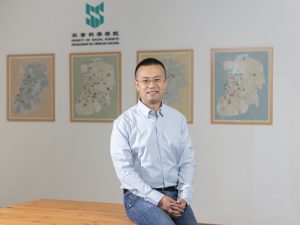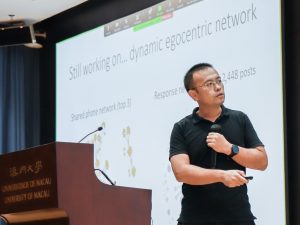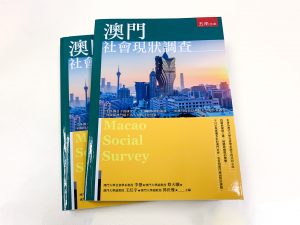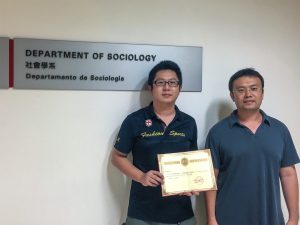‘The world is so big. Why should we limit ourselves to one specific area when studying a problem?’ Cai Tianji, associate dean of the Faculty of Social Sciences and professor in the Department of Sociology at the University of Macau (UM), seldom sets boundaries for himself in research. His research interests cover criminology, behavioural sciences, and educational psychology, all of which heavily draw on interdisciplinary knowledge. In this article, we explore how Prof Cai, a strict teacher who strives for perfection, uses computational sociology as a ‘microscope’ to examine social issues and listen to the voices of society through data.
Thinking outside the Box
Every day, Prof Cai brings two cans of energy drinks to his office to drink while conducting research. ‘When I finish my energy drinks, I drink coffee. Now I drink at least four cups of coffee a day,’ he said. Drinking coffee is a habit Prof Cai picked up when he was a student at the University of North Carolina at Chapel Hill (UNC-CH). He says that caffeine does not necessarily increase his productivity, but drinking coffee is a ‘ritual’ that enables him to get in the groove quickly.
With a strong passion for mathematics and statistics, Prof Cai is good at rational thinking and logical analysis, which helps him to perform research tasks based on quantitative analysis, data mining, natural language processing, and social network analysis. He places no limits on research topics and strives to promote interdisciplinary research in criminology, behavioural sciences, and educational psychology. ‘By combining the strengths of different disciplines in our research, we are able to get to the heart of social issues,’ added Prof Cai.
A straightforward person, Prof Cai said at the outset of our interview that researchers should not limit themselves to one specific area when studying a problem. ‘When doing research, we have to go beyond the theory itself. If we just apply the theory to explain a current social situation, we are only validating that theory,’ he added.
Studying what is not in the textbooks
Learning is a gradual process of accumulating knowledge, and Prof Cai never ceases to acquire new skills. During his undergraduate studies at Lanzhou University, he read numerous books about sociological theories, yet still considered himself to have a rudimentary understanding of sociology. To strengthen his knowledge, he went to Peking University in 2001 to pursue a master’s degree in demography, a branch of sociology that is not a popular field in the eyes of the public. While the field requires mathematical fluency, it does not lead to great job prospects. China’s economy was booming at the time and his classmates aimed for well-paid professions, but Cai never wavered in his academic pursuits. ‘I wanted to start afresh with mathematics and statistics, acquire new knowledge, and build a solid foundation for my study in sociology,’ he said.
The first obstacle Cai encountered in demography studies was programming. The SPSS statistical software that he first used was the eighth edition (which has now been updated to the 22nd edition), which was popular for its easy-to-use GUI features. However, its syntax language that could handle complex data management tasks was not sophisticated enough as nowadays, and the programming textbooks available at the time were written for the sixth edition. Even so, Cai did not give up, and just said, ‘Hey, this is interesting.’ In the year that followed, Cai studied programming syntax that was not included in the textbook.
On one occasion, Cai’s supervisor asked Cai to help analyse questionnaire data collected from the China Population Census and provided SPSS codes for him to identify family structures. However, some types of family structures could not be distinguished, and the result had to be checked for errors and corrected manually. Cai spent the whole night thinking about how to improve the code previously written by his supervisor. He succeeded in identifying the remaining family structures and the changes he made simplified the process. ‘My supervisor was astonished at the result and gave me access to the data as a reward,’ said Prof Cai, who from then on began to observe the evolution of social structure and institutional changes through demographic analysis.
Exploring the influence of genes on human behaviour
After completing his master’s degree at Peking University, Cai entered UNC-CH in 2004 and obtained his master’s and PhD degrees in sociology. Always focused on sociology research before studying abroad, Cai had no idea that his academic journey at UNC-CH would lead him to biology and genetics. In his first year of PhD studies, he took part in a research project led by his supervisor and explored how the interaction between genes and the social environment can influence human behaviour. The research project introduced molecular genetics into sociology to explore the mysteries of human behaviour, which opened a new door for Cai. ‘This kind of research was very bold at that time because, after World War II, Western societies believed that human behaviour was influenced by social culture, education, and family structure, rather than the genes that people were born with,’ said Prof Cai.
Starting in 2008, the team conducted a series of studies on the health behaviours of individuals from adolescence to adulthood in the United States. ‘We looked at adolescents’ tendency to seek multiple sexual partners, their propensity for violence, and behavioural problems such as substance abuse, alcohol use, and tobacco use. The findings indicate that individuals with specific genes or biomarkers are more likely to show these behaviours when stimulated by their living environment or certain encounters,’ said Prof Cai.
At the beginning of the 21st century, the rapid development of technology for gene sequence analysis took behavioural studies in sociology to a new level, enabling researchers to use science to reveal the truth about genes. However, it also posed new challenges to traditional research methods, such as the incorporation of a vast amount of genetic information into social science models, and that provided Cai with a great opportunity to apply his newly acquired knowledge of statistics.
Conducting sociological research with AI technologies
In 2013, Cai returned to China to serve as an assistant professor in the UM Department of Sociology, which was the beginning of his research career in Macao. At that time, big data was taking the world by storm. Foreseeing that there would be radical changes in sociological research, he began to explore technologies such as deep learning, artificial intelligence, and big data, in an effort to integrate smart technologies into research. Currently, Prof Cai and his colleagues in the department are actively using smart research tools for social network analysis and natural language processing, aiming to promote innovation in quantitative methods in sociological research and facilitate the development of computational sociology.
Prof Cai quoted the French writer Marcel Proust to describe computational sociology: ‘The real voyage of discovery consists not in seeking new landscapes but in having new eyes’. He pointed out that the development of digital technology allows us not to see the same land with the same pair of eyes, but with a hundred different pairs of eyes. For example, with organised sex trade in Macao as an entry point, Prof Cai made use of technologies such as text mining, face recognition, image analysis, and network analysis to reveal social phenomena that are difficult to do so with traditional methods.
In addition, Prof Cai introduces his PhD students to computational sociology and guides them in research on criminal judgements in mainland China using natural language processing techniques. He and his students have addressed a variety of sub-topics, including the application of new models, factors influencing convictions, and crime patterns. They have published a number of high-quality papers, such as ‘Paying Money for Freedom: Effects of Monetary Compensation on Sentencing for Criminal Traffic Accident Offenses in China’, ‘Effect of Judges’ Gender on Rape Sentencing: A Data Mining Approach to Analyze Judgment Documents’, and ‘Mapping Trafficking of Women in China: Evidence from Court Sentences’. Together they have made important contributions to the field of criminal justice by examining the patterns and characteristics of criminal trials in mainland China.
Prof Cai’s persistence in seeking changes has led to his continued success. To date, he has published 50 articles in international journals, including the American Sociological Review, American Journal of Sociology, Sociological Methodology, Social Science Research, Demography, Journal of Quantitative Criminology, Journal of Contemporary China, and Chinese Sociological Review.
Conducting the Macao social survey
Before Prof Cai joined UM, faculty members and students in the Department of Sociology had already noticed that the severe lack of empirical data on the Macao population was hampering the development of research on many major social issues. To fill this gap, Prof Cai joined a team led by Prof Li De in the same department and began a survey in 2015 with other like-minded students and colleagues, such as Associate Professors Wang Hongyu and Kuo Shih-Ya. In the project, Cai was responsible for the technical work of sampling design, data collation, and weighting. The results of the survey were later published as Macao Social Survey.
Conducting a citywide survey is not an easy task as there are always many technical problems to solve. ‘Macao has a population of over 600,000. What is the most accurate and representative way to draw a random sample? How can we conduct a household tracking survey with limited manpower and resources? How can we ensure that the large amount of data collected can be used to establish key social indicators? These were some of the issues that we had to address,’ said Prof Cai, who further pointed out that the issues were directly related to the reliability of the study and would ultimately affect the validity of the findings. For this reason, every single step of the survey had to be taken very seriously.
At the time, Macao did not have a comprehensive sampling system in place. To work around it, Prof Cai and other team members tagged every building in Macao on Google Maps and Baidu Maps. Because the number of people living in each district of Macao was unclear, they counted the mailboxes in each building to determine the number of households in the areas delineated in the Macao SAR government’s population census; for buildings without mailboxes, they counted the number of households by going door to door, floor by floor. Their meticulous work ensured the reliability of the final survey results — Using the multi-stage proportional stratified sampling method, the team sampled over 2,600 households and conducted individual interviews with over 3,500 people aged 16 or above.
From research design to publication, it took the team five years to complete the Macao Social Survey. The survey covered social stratification, migration, family transition, employment, physical and mental health, addiction, and criminal behaviour in Macao, and is currently the largest social survey in the city. In 2022, the book with the same name received a second prize in the publication category of the Outstanding Achievement Awards for Macao Research in Humanities and Social Sciences.
High-quality academic pursuit
What a research novice needs most are opportunities and guidance, and Prof Cai is no exception. His first journal article was almost rejected, but fortunately, the reviewer gave him an opportunity to revise it. This incident may seem insignificant, but it meant a lot to Cai as a newcomer to academia. Prof Cai has taken this experience to heart and pays it forward, assisting young researchers as much as he can.
‘Prof Cai is very rigorous in research. He always makes sure that every single word and figure is used correctly and proofreads meticulously to prevent mistakes. Most of the papers he supervised have been accepted by top journals,’ said Xia Yiwei, who was a PhD student under Prof Cai’s supervision. The paper they co-authored won first prize at a national conference on drug abuse prevention and treatment. Xia is now an associate professor at the Law School of Southwestern University of Finance and Economics, where he also specialises in quantitative research. ‘I have learned a lot from Prof Cai, and I am now supervising my students in the way Prof Cai supervised me’, Xia added.
Conducting research requires a high degree of concentration, and it has not been easy for Prof Cai, who suffers from eye injuries. He has to take a break every 20 minutes, yet this has not stopped him from maintaining a high quality of research output over the years. ‘Intelligent computing is already breaking down the boundaries of social science disciplines, and the interpretation-based paradigm will soon be replaced. We need to have the courage to be ahead of everyone else and develop new approaches to predict social issues and phenomena through high-precision analysis,’ said Prof Cai.
Text / Kelvin U, Trainee UM Reporter Li Xinwei
Photo / Jack Ho
English Translation / Winky Kuan
Source: My UM ISSUE 122




